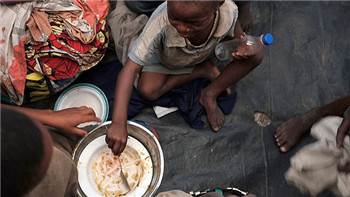(单词翻译:单击)

Rich countries sent $137bn in aid to poor countries in 2014, plus large amounts given through non-governmental organisations. People give because they feel a moral obligation to help those who live and die in destitutione destitute. Yet we still do not know whether these gifts are helping or hurting, or how to use the money to good effect.
2014年,富裕国家向贫穷国家提供了1370亿美元的援助,另外还有通过非政府组织(NGO)提供的大量资金。人们愿意捐助,因为他们觉得有道德义务去帮助那些赤贫之人。然而,我们仍不知道这些捐助对他们是帮助还是伤害,也不知道如何让这些资金发挥好的作用。
The obvious answer is to give to those who suffer most. Yet many of the people in the greatest need are those living live in countries where aid would be wasted — because of war, because their governments exploit their citizens rather than help them or because the state has little capacity to govern. Giving money directly to citizens, or via NGOs, does little to block a powerful “extractive” state.
看上去很明显的答案是向那些处境最艰难的人提供援助。然而,许多最需要帮助的人都生活在援助被浪费的国家——因为战争,因为他们的政府剥削本国公民而非帮助他们,或是因为政府几乎没有治理能力。把钱直接(或通过NGO)交给公民,无法阻止一个强大的“压榨型”政府。
Aid given to good governments in poor countries can work, but capable governments have other, often better, alternatives, such as borrowing from international capital markets. Whatever the disposition of the government, large aid flows detach leaders from the needs of their people, making them like the autocrats who sit on mining and oil revenuesells whose revenues require no cooperation from their citizens. In Africa alone, there are more than a dozen governments who obtain more than half their revenue from foreign aid.
把援助交给贫穷国家的好政府可以发挥作用,但有能力的政府有其他(通常更好)的选择,如从国际资本市场获得贷款。无论什么性质的政府,大量援助流入都会让领导人脱离人民的需求,让他们变得像坐拥矿山或石油收入而无需公民合作的独裁者。仅在非洲,就有十多国政府超过一半的收入来自外国援助。
Aid administrators are impaled on this fork. Their home citizens want an impossible combination: aid, they say, must go to those in most need and aid must be effective.
援助管理者也很为难。援助国公民的愿望是一个不可能实现的组合:他们既要求援助必须发放给那些最需要的人,又希望援助必须产生预期效果。
What if we fund only those projects that have been thoroughly evaluated and shown to work? But evaluations rarely capture unintended consequences, such as the government reducing its provision when foreigners do its job for it, or when accountability to beneficiaries is lost by replacing internal by with external provision. The “what works” agenda also runs of the risk of replacing what (local) people want by what (often foreign) technocrats think they ought to have. It is these unintended consequences that explain why many projects succeed while the country fails.
如果我们只资助那些经过彻底评估并显示可行的项目,结果会怎样?但评估很少能预计到意想不到的后果,例如,当外国人帮一国政府履行了它该履行的职责,或者外国人提供的物资代替了一国内部提供的物资、使得该国政府丧失对受益者的责任感,该政府就会减少自身提供的物资。这种基于“可行项目”的援助理念还存在一种风险——以(通常是外国人的)技术专家认为(当地)人民应该需要什么代替后者真正需要什么。正是这些意想不到的后果可以解释,为什么许多项目成功了,而受援国却垮掉了。
One solution to the aid dilemma is to work outside the recipient’s borders and provide global public goods. Examples include basic scientific research, particularly in health; better control of the arms trade (why are some European countries who are so enthusiastic about aid so keen to sell arms?); trade policies that help reduce poverty; and the provision of high-quality, unbiased advice to countries negotiating trade deals with richer, larger and better-prepared neighbours.
破解援助困境的方法之一是在受援国以外做工作,并提供全球公共产品。这样的例子包括基础科学研究,特别是在医疗领域;更好地控制武器贸易(为什么一些如此热心对外援助的欧洲国家又如此热衷于出售武器?);实施有助于减少贫困的贸易政策;为那些与更富有、更大、更有优势的邻国谈判贸易协议的国家提供高质量、无偏见的建议。
For the same reasons, I am sympathetic to using aid funds to help refugees and migrants, not because they are poorer than those who are not moving — this is rarely the case — but because the money is spent in the donor country where outcomes can be monitored by the funders and are thus subject to informed democratic debate. Of course, we need to be careful which programmes are reduced when funds are reallocated.
出于同样的原因,我赞成用援助资金帮助难民和移民,不是因为他们比那些留在本国的人更贫穷(很少出现这种情况),而是因为这样一来钱就花在援助国国内,其效果可以由出资者监督,进而可以在信息充分的条件下进行民主辩论。当然,重新分配资金时,我们需要谨慎对待削减哪些项目。
Does this mean that help should only be provided from a distance? Does effective aid mean excluding those whose lives we know could be saved? I have to come to think not.
这是否意味着援助只应远距离提供?有效的援助是否意味着要排除那些我们知道可以拯救、但是身处受援国国内的人?我不这样认为。
One of the greatest recent achievements of aid has been that so many are alive today who would be dead but for aid-funded antiretroviral therapies, as well as the many children whose lives have been saved by the use of insecticide-treated bed nets, and by reducing mother-to-child transmission of HIV. Even when aid-funded provision reduces local responsibility, risking future health, the issue becomes a trade-off between lives (certainly) saved today and lives (possibly) lost tomorrow. We should surely decide in favour of lives today, especially if we are careful to do what we can to minimise —I don’t believe we can eliminate—long-term negative consequences.
近年来最伟大的援助成就之一是,如果没有援助的抗逆转录病毒疗法,很多人可能活不到现在,还有许多儿童因使用经杀虫剂处理的蚊帐以及母婴间HIV病毒传播的减少保住生命。即使援助提供的物品减少了当地政府的责任感,从而可能威胁该国民众的未来健康,但这一问题是在今天(一定能够)拯救的生命与明天(可能)失去的生命之间的取舍。我们当然应该做出保护今天的生命的决定,特别是如果我们小心翼翼地尽我们所能减少(我不相信我们能根除)长期的负面后果。
My belief that we should follow this route has been strengthened in recent conversations with the Global Fund to Fight Aids, Tuberculosis and Malaria. In most countries, the Global Fund is able to exploit the synergy that comes from the fact that their drugs are supplied in clinics that double up for other purposes, such as maternal and child health, thus improving overall health outcomes beyond those immediately targeted.
最近与全球艾滋病、肺结核和疟疾基金(Global Fund to Fight Aids, Tuberculosis and Malaria)的交谈加强了我对于我们应遵循此路线的信念。该基金之所以能够在多数国家实现协同效应,是因为他们的药品是在那些同时提供其他医疗服务(如妇幼保健)的诊所供应,从而可以在实现既定目标之外提升整体医疗效果。
The Global Fund agrees that it would be better if countries were to fund their own drugs and health systems, and the organisation has had considerable success in working towards country funding and away from international aid. This is an continuing process and it will take time for the Global Fund to close shop, which is its aim. But stopping today would cost many lives, too high a price to accept. Such life-saving programmes should therefore be excepted from the “not within the country” critique of aid.
该基金认为,如果各国能为本国的药品及医疗系统提供资金的话将会更好,而该组织在帮助各国自己提供资金、而非依靠国际援助方面已经取得了相当大的成功。这是一个持续的过程,该基金要“关门大吉”还需要时日,而这正是它的目标。但如果今天就关门,许多生命将得不到挽救,这是一个高到无法让人接受的代价。因此,此类挽救生命的项目不适用“不宜在受援国国内进行援助”的观点。


